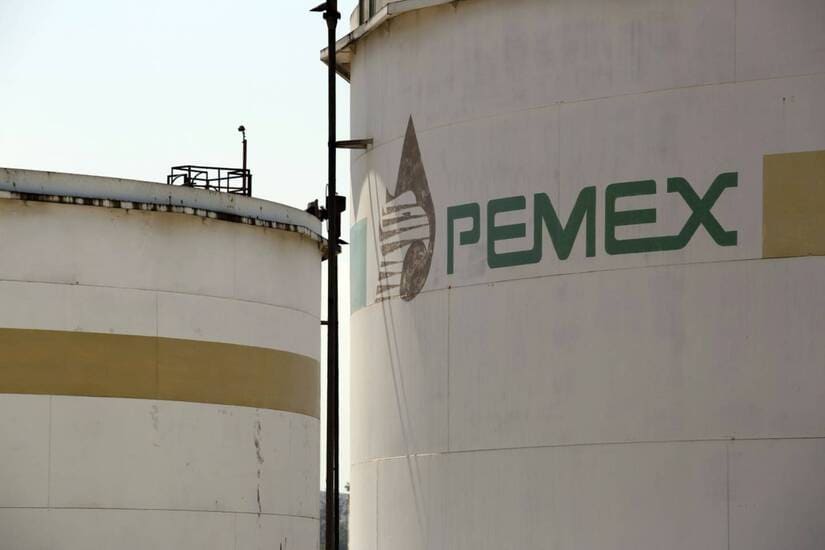The Mexican oil company Pemex is seeking solutions to pay off its $105 billion financial debt, in an attempt to take advantage of high oil prices to make profits, after the government withdrew its support.
The company is looking for funds to make approximately $10 billion in bond payments in the current year (2023), an amount that neither the company nor the government included in its annual budgets.
The company is under enormous financial pressure, because the Mexican government wants it to stop oil exports and invest in refineries that are incurring losses, according to information monitored by the specialized energy platform.
Mexican oil company
After providing the company with financial support in recent years through tax exemptions and capital injections, the ministry stopped covering Pemex’s debts in the second half of 2022.
The Finance Ministry expects the oil giant to foot the bill in the first quarter of 2023 without government help, while President Andres Manuel Lopez Obrador has pledged that his government will step in to help the company if needed.
This prompted investors to ask whether the company would go to international markets, try to sell unpaid oil product invoices, or find other ways to secure financing, according to Bloomberg.
“It has become clear that under this administration, there is not going to be a major bailout for the Mexican oil company,” said Roger Horn, chief strategist at SMBC Nico Securities America.
He added that large asset sales, similar to Brazil’s breakup of state-owned Petrobras, seemed unlikely.
Insufficient attempts at financing
Pemex has drawn up plans to try to sidestep the market, in an effort to keep its debt level at about $105 billion through 2027, by looking for “discreet and innovative” financing alternatives.
International debt markets have become much more expensive because of the Fed’s aggressive monetary tightening, especially for junk-rated borrowers such as Pemex.
The company’s most recent debt maneuver in June 2022 – which paid oil suppliers in cash to be exchanged later – failed. due to weak demand.
The oil giant also raised cash last year by selling unpaid invoices for oil and petroleum products to banks, a process known as factoring.
In the second half of 2022, HSBC and Goldman Sachs awarded the Mexican company at least $1 billion in a deal linked to the sale of receivables, and HSBC also committed the company to reducing greenhouse gas emissions.
Produced by the Mexican Oil Company
However, these financing solutions may not be enough; Chief Executive Octavio Romero Oropeza said Pemex had debt write-offs of between $5.5 billion and $6 billion in the first quarter alone, and owed as much as 188 billion pesos ($9.8 billion) this year.
And if forced, the company could use its 2023 budget to pay down debt, a move that would further strain its ailing oil operations.
The Mexican company’s oil production has fallen nearly every year since 2004, and it has failed to develop major discoveries to replace the old huge fields.
The following chart – prepared by the specialized energy platform – shows Mexico’s oil reserves:
Under Andrés Manuel López Obrador’s mandate, the company has focused on increasing production at its aging and unprofitable refineries, rather than high-value exploration.
Those operational deficiencies caused the company to lose billions in the third quarter of 2022, even as high oil prices helped international competitors collect record profits.
However, Wall Street saw an opportunity in the company’s high-yield debt because of its ties to the government; Pemex bonds due in 2028 yield about 4% more than Mexican government bonds with the same maturity date.
Finding alternative solutions
Earlier this month, CEO Octavio Romero Oropeza said he had been in talks with the Finance Ministry since the last quarter of 2022 to find an option for the company to pay off its outstanding debts, because amortizations are not included in the budget.
He pointed out that the rise in oil prices could enable the company to find alternatives, saying: “We already have many alternative solutions.”
And Romero stressed – in a press conference held on January 4, 2023 – that the company is reducing its debt: “We are managing this debt together with the federal government and the Ministry of Finance,” according to what was reported by Bloomberg Agency.
Pemex’s bonds due in 2050 rose nearly 1 cent, to 71 cents last Wednesday morning in New York, according to tracking data.
related topics..
Also read..

Leave a Reply